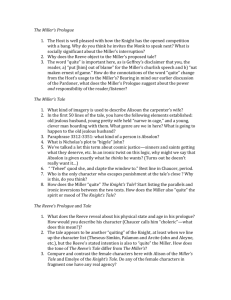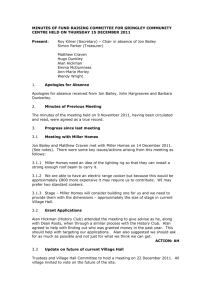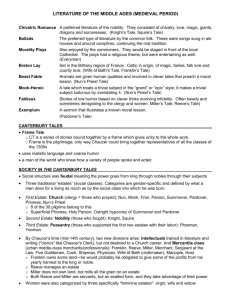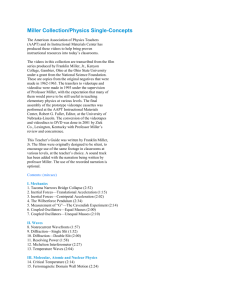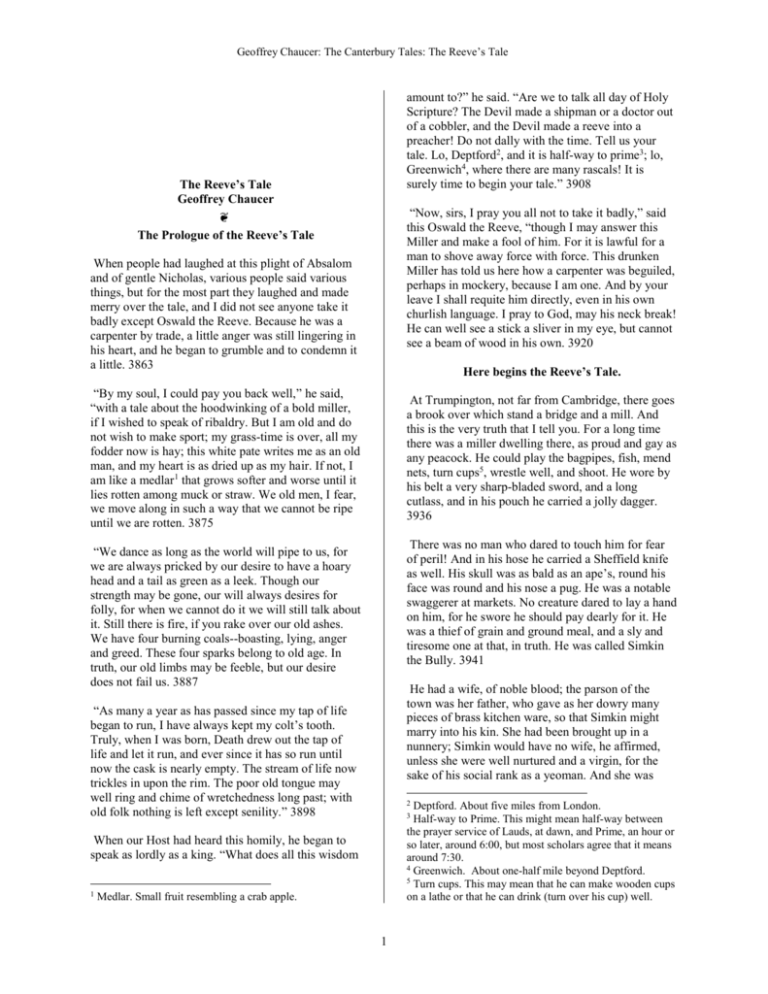
Geoffrey Chaucer: The Canterbury Tales: The Reeve’s Tale
amount to?” he said. “Are we to talk all day of Holy
Scripture? The Devil made a shipman or a doctor out
of a cobbler, and the Devil made a reeve into a
preacher! Do not dally with the time. Tell us your
tale. Lo, Deptford2, and it is half-way to prime3; lo,
Greenwich4, where there are many rascals! It is
surely time to begin your tale.” 3908
The Reeve’s Tale
Geoffrey Chaucer
“Now, sirs, I pray you all not to take it badly,” said
this Oswald the Reeve, “though I may answer this
Miller and make a fool of him. For it is lawful for a
man to shove away force with force. This drunken
Miller has told us here how a carpenter was beguiled,
perhaps in mockery, because I am one. And by your
leave I shall requite him directly, even in his own
churlish language. I pray to God, may his neck break!
He can well see a stick a sliver in my eye, but cannot
see a beam of wood in his own. 3920
❦
The Prologue of the Reeve’s Tale
When people had laughed at this plight of Absalom
and of gentle Nicholas, various people said various
things, but for the most part they laughed and made
merry over the tale, and I did not see anyone take it
badly except Oswald the Reeve. Because he was a
carpenter by trade, a little anger was still lingering in
his heart, and he began to grumble and to condemn it
a little. 3863
Here begins the Reeve’s Tale.
“By my soul, I could pay you back well,” he said,
“with a tale about the hoodwinking of a bold miller,
if I wished to speak of ribaldry. But I am old and do
not wish to make sport; my grass-time is over, all my
fodder now is hay; this white pate writes me as an old
man, and my heart is as dried up as my hair. If not, I
am like a medlar1 that grows softer and worse until it
lies rotten among muck or straw. We old men, I fear,
we move along in such a way that we cannot be ripe
until we are rotten. 3875
At Trumpington, not far from Cambridge, there goes
a brook over which stand a bridge and a mill. And
this is the very truth that I tell you. For a long time
there was a miller dwelling there, as proud and gay as
any peacock. He could play the bagpipes, fish, mend
nets, turn cups5, wrestle well, and shoot. He wore by
his belt a very sharp-bladed sword, and a long
cutlass, and in his pouch he carried a jolly dagger.
3936
There was no man who dared to touch him for fear
of peril! And in his hose he carried a Sheffield knife
as well. His skull was as bald as an ape’s, round his
face was round and his nose a pug. He was a notable
swaggerer at markets. No creature dared to lay a hand
on him, for he swore he should pay dearly for it. He
was a thief of grain and ground meal, and a sly and
tiresome one at that, in truth. He was called Simkin
the Bully. 3941
“We dance as long as the world will pipe to us, for
we are always pricked by our desire to have a hoary
head and a tail as green as a leek. Though our
strength may be gone, our will always desires for
folly, for when we cannot do it we will still talk about
it. Still there is fire, if you rake over our old ashes.
We have four burning coals--boasting, lying, anger
and greed. These four sparks belong to old age. In
truth, our old limbs may be feeble, but our desire
does not fail us. 3887
He had a wife, of noble blood; the parson of the
town was her father, who gave as her dowry many
pieces of brass kitchen ware, so that Simkin might
marry into his kin. She had been brought up in a
nunnery; Simkin would have no wife, he affirmed,
unless she were well nurtured and a virgin, for the
sake of his social rank as a yeoman. And she was
“As many a year as has passed since my tap of life
began to run, I have always kept my colt’s tooth.
Truly, when I was born, Death drew out the tap of
life and let it run, and ever since it has so run until
now the cask is nearly empty. The stream of life now
trickles in upon the rim. The poor old tongue may
well ring and chime of wretchedness long past; with
old folk nothing is left except senility.” 3898
2
Deptford. About five miles from London.
Half-way to Prime. This might mean half-way between
the prayer service of Lauds, at dawn, and Prime, an hour or
so later, around 6:00, but most scholars agree that it means
around 7:30.
4 Greenwich. About one-half mile beyond Deptford.
5 Turn cups. This may mean that he can make wooden cups
on a lathe or that he can drink (turn over his cup) well.
3
When our Host had heard this homily, he began to
speak as lordly as a king. “What does all this wisdom
1
Medlar. Small fruit resembling a crab apple.
1
Geoffrey Chaucer: The Canterbury Tales: The Reeve’s Tale
proud and pert as a magpie. The two together were a
fair sight on holy days; he would walk before her
with the tail of his hood wound about his head, and
she came after him in a red petticoat, and Simkin
wore hose of the same color. 3955
Now there dwelt in this Hall that I tell of two young
poor clerks. They were bold and headstrong and lusty
in sport, and they eagerly begged of the warden, only
for the fun and joy of it, to grant them a leave for
only a little while to go to the mill and see their corn
ground. And truly they would wager their own heads
that the miller would steal half a peck of corn from
them by cunning or plunder it from them by force.
And at last the warden gave them leave. One of them
was named John, and the other, Alan. They were
born in the same town; it was called Strother, far in
the north. I cannot tell exactly where. 4015
No creature dared call her anything but “madam.”
There was no man so bold that he would walk near
her or dared once to flirt or dally with her, unless he
wished to be slain by Simkin with a cutlass or knife
or dagger. For jealous people are always perilous—at
least they would have their wives believe so. And
because she was somewhat smirched in her name 6,
she was as repellent as water in a ditch, and full of
disdain and of insolence. She thought ladies should
treat her with respect, on account of her lineage and
of the nurturing she had gained in the nunnery. 3968
This Alan, the clerk, prepared everything that he
needed to take, cast the sack of corn over a horse, and
went forth with John. And they wore good swords
and bucklers by their thighs. John knew the way; so
they needed no guide. And he laid down the sack at
the mill door. 4021
They had between them a twenty-year-old daughter
and no other children, except one of six months; it lay
in a cradle, and was a proper lad. This young lady
was sturdy and well grown, with broad hips and
round high breasts, and a pug-nose and eyes gray as
glass. Her hair was rather pretty, I will not deny it.
3976
Alan spoke first: “All hail, Simon, in faith! How is
your wife, and your fair daughter?” 4023
“Alan, welcome, by my head!” Simkin said. “And
John too! How are you, and what are you doing
here?” 4025
Because she was attractive, the parson of the town
intended to make her his heir of both his movable
property and his house. And he made plenty of fuss
about her marriage; his purpose was to present her
well into some family of exalted lineage and blood.
For Holy Church’s goods must be spent on the blood
that is descended from Holy Church; therefore, he
meant to dignify his holy blood, even if he should
devour Holy Church. 3986
“Simon,” replied John, “by God, need has na peer8.
It behooves him to serve himself that has na equal, as
clerks say, or else he is a fool. I believe our manciple
will die soon, so the jaws waggle in his head. And
therefore I have come with Alan to grind our corn
and carry it home. I pray you help us along from here
as fast as you can.” 4033
“In faith it shall be done,” Simkin said. “What will
you do while it is being milled?” 4035
This miller surely collected a great toll on the wheat
and malt from all the surrounding lands. And most
notably there was a great college that is called King’s
Hall at Cambridge, all the wheat and malt for which
were ground by him. It happened one day that the
manciple7 of the college fell ill of some sickness;
they deemed that surely he could never recover.
Therefore this miller stole a hundred times more of
the meal and corn than any other time. Before this he
stole only courteously, but now he was a thief
outrageously. The warden reproached him for this
and made much ado about it, but the miller did not
care one straw about it, and blustered fiercely and
said it was not so. 4001
“By God, I will be here right by the hopper,” John
said, “and see how the corn gaes in. By my father’s
soul, I never yet saw how the hopper wags to and
fra.” 4039
“And do you wish to do swa?” answered Alan.
“Then, by my pate, I will be beneath, and see how the
meal falls down into the trough; that sail be my
amusement. In faith, John, I must be of your class, I
am as poor a miller as you.” 4045
8
Na peer. As noted a bit earlier in the story, John and Alan
are from northern England, which Chaucer shows in their
dialect. In this translation, many of Chaucer’s touches have
been maintained, such as na (no), swa (so), fra (fro), sall
(shall), gane (gone), alsa (also), bath (both), ga or gae (go),
ane (one), twa (two), sang (song), and sawl (soul).
6
Smirched in her name. She is the illegitimate daughter of
a priest or parson.
7 Manciple. A steward, or a purchase of provisions.
2
Geoffrey Chaucer: The Canterbury Tales: The Reeve’s Tale
This miller smiled at their simplicity. “All this is
only done as a stratagem,” he thought; “they deem no
man can beguile them. But I vow by my trade, for all
the craftiness in their philosophy, I shall still blear
their eyes. The more cunning trick they try, the more
I will take when I steal. I shall give them bran yet in
the place of flour. “The greatest clerks are not the
wisest men,” as the mare once said to the wolf9. I
would not give a weed for their art. 4056
they go! By my pate, it’s not so easy for them to get
that horse. Yes, let the children play!” 4099
Out the door he secretly went when he saw his time.
He looked up and down until he found the clerks’
horse where it stood tied under an arbor behind the
mill; and went softly to the horse and swiftly stripped
off the bridle. And when the horse was loose, he
started forth with a “Wehee!” through thick and thin
toward the fen, where wild mares ran. 4066
Wet and weary, like a beast in the rain, poor John
came, and Alan with him. “Alack the day I was
born!” said John. “Now we are brought to mockery
and ridicule; our corn is stolen. People will call us
fools, bath the warden and all our friends, and
especially the miller. Alack the day!” 4113
These poor clerks ran up and down, with “Whoa,
whoa! Gee! Stop, stop! Ha! Look out behind! Gae
whistle you while I head him off here!” But, in brief,
they could not with all their power catch their nag, he
always ran so fast, until at length they caught him in
a ditch when it was dark night. 4106
Thus John lamented as he walked along the road
toward the mill, leading Bayard the horse by the
bridle. He found the miller sitting by the fire, for it
was night. They could go no further then, but begged
him for the love of God to give them lodging and
food, for their payment. 4119
This miller went back. He did not say a word, but
did his business and chatted with the clerks until their
corn was ground nicely and well. And when the meal
was sacked and fastened, John went out and found
his horse gone, and began to cry, “Help! Alack! Our
horse is lost! Alan, for God’s sake, man, step on your
feet, come out at once! Alas, our warden has lost his
palfrey!” 4075
“If there be any,” the miller replied, “such as it is,
you shall have your part in it. My house is small; but
you have studied book learning, so you know how to
make twenty feet of space a mile wide through
argumentation. Let see now if this house may suffice,
or make it bigger by your talking, as you clerks
usually do.” 4126
Alan forgot everything, including the meal and
wheat. His careful management of the situation
entirely escaped his mind. “What!” he began to cry.
“Which way is he gane?” 4078
The wife came leaping in with a run. “Alas!” she
said, your horse is going to the fen with wild mares,
as fast as he can gallop. Curses on the hand that
bound him so poorly, he should have tied the rein
better.” 4083
“Now, Simon,” said John, “you are always merry, by
Saint Cuthbert, and that was fairly answered. I have
heard it said that a man shall choose ane of twa
things: either just as he finds or just as he brings. But
especially I pray you, dear host, get us some food and
drink and be friendly, and we will pay faithfully and
completely. One can lure no hawks with an empty
hand; lo, here is our silver, all ready to spend!” 4135
“Alas!” said John. “By the Cross, Alan, lay down
your sword, and I will mine alsa. I am nimble, God
knows, as a deer. By God, he shall not escape us
bath! Why had you not pit the nag in the barn? A
curse on you, Alan. You are a fool.” 4089
This miller dispatched his daughter into town for ale
and bread, and roasted a goose for them, and secured
their horse so that it would not go astray any more.
He made them a bed in his own chamber, nicely
decked with sheets and blankets, only eight or ten
feet from his own bed. His daughter had a bed to
herself right in the same chamber very close at hand.
It could be no other way, and the reason is that there
was no larger room in the place. 4145
These poor clerks ran hard toward the marsh, both
Alan and John. And when the miller saw they were
off, he took half a bushel of their flour, and told his
wife to go and knead it in a loaf. 4094
“I believe the clerks were afraid of what I might do.
A miller can still,” he said, “trim a clerk’s beard for
all his art; now let them go where they will. Lo, there
They supped and talked and amused themselves, and
drank ever deeper of the strong ale, and about
midnight went to rest. 4148
9
Mare to the wolf. The mare told the wolf, who wanted to
buy her foal, that the price was written on her hind foot.
When he tried to read it, she kicked him. (Benson)
3
Geoffrey Chaucer: The Canterbury Tales: The Reeve’s Tale
Well had this miller varnished his head with the
beer, for he had drunk himself all pale and lost all the
red in his flesh. He belches and speaks through his
nose as if he had a frog in his throat or a cold. His
wife went to bed also, as light and frisky as any jay,
so well had she wet her jolly whistle. The cradle was
put at the foot of her bed, so that she might rock it
and nurse the child. 4157
wicked trick. I would say now that I am just a fool.
Yet my friend has gained something for his trouble;
he has the Miller’s daughter in his arms. He took a
risk and has accomplished his purpose, and I lie here
like a sack of chaff12 in my bed; and when this prank
is retold another day, I shall be thought a fool, a
weakling. I will rise and risk it, by my faith! ‘One
who is not bold is not lucky!’ as they say.” And up he
rose, and softly he went to the cradle, took it up with
his hand, and bore it to the foot of his own bed. 4213
And when all that was in the crock had been drunk,
the daughter went to bed. And Alan and John went to
bed as well. None of them took anything else; they
needed no sleeping potion! Truly, the miller had so
gulped his ale that he snorted in his sleep like a horse.
His wife bore him a full strong bass; one could have
heard their snoring two furlongs away. The daughter
snored also, to keep them company. 4167
Soon after this the wife stopped snoring, awoke,
went out to pee, returned again, could not find her
cradle, and groped here and there but did not find it.
“Alas,” she said, “I almost went to the wrong place; I
almost went to the clerk’s bed. Ah, God bless! Then I
would have made a bad mistake. And she went forth
and found the cradle. She groped along with her
hand, found the bed, and thought all was well since
the cradle stood next to it. And she did not know
where she was since it was dark. 4225
Alan the clerk, hearing all this tunefulness, poked
John and said, “Are you sleeping? Have you ever
heard such a sang before this? Lo, what a compline 10
they are singing among them. May Saint Antony’s
fire11 fall on their bodies! Wha ever heard such an
amazing thing? Yea, may they come to the best of
bad ends! This lang night I shall get na sleep; but yet
na matter, all shall be for the best. For, John, if I
could sleep with that young lady over there, the law
would allow us some compensation. For, John, there
is a law that says that if a man be harmed in one
point, he shall be relieved in another. Our corn is
stolen, without a doubt, and all day we have had an
bad time; and since all that cannot be remedied, I
shall have some easement to counter my loss. By my
sawl, it shall nat be otherwise. 4187
And softly and carefully she crept into bed with the
clerk, and lay perfectly still, and would have fallen
asleep. In a while John the clerk leapt up and with all
his energy laid on this wife. She had had such a good
time for a long time. He pierced hard and deep, as if
her were mad. 4231
These two clerks led this jolly life until the cock
crowed the third time.13 Alan grew weary in the time
before dawn, for he had labored all night long, and
said Farewell Malyne, sweet one! The day has come;
I can stay no longer. But forever, wherever I may
ride or go, I am your own clerk, I swear!” 4239
“Be careful, Alan,” John answered. “The miller is a
dangerous man, and if he would start out of his sleep
he might do us bath a shrewd turn. 4191
“Dear sweetheart,” she said, “now go, and farewell!
But before you go, I will tell you one thing. When
you pass the mill going homeward, right at the
entrance behind the door you will find a loaf that was
made of a half a bushel of your own meal, which I
helped my father to take. And now, good friend, may
God save and keep you.” And with that word she
began to weep. 4248
“I do not count him as much as a fly,” Alan replied,
and up he rose. He crept up to the young woman (she
lay on her back and slept soundly) until he was so
close to her that, before she could see him, it was too
late fro her to cry out. And, to make a long story
short, they were soon one. Go ahead and play, Alan,
for I will now speak of John. 4198
Alan rose up and thought, “Before it is day I will go
creep in next to my fellow;” and then his hand
touched the cradle. “By God,” he thought, “I have
gone all wrang; my head is all giddy tonight, and
therefore I am not walking straight. I know well by
John lay still for about five minutes or so, and pities
himself, and feels woeful. “Alan” he said, “this is a
10
Compline. The last prayer office of the day, after
darkness falls.
11 St. Anthony’s Fire. Ergotism, a disease that comes from
eating grain infected by the ergot fungus and affects the
sufferer with inflamed skin. (Chaucer only mentions
“wylde fyr,” but most have assumed that he means St.
Anthon’s Fire.
12
Chaff. The discarded part of a grain, used to feed
livestock.
13 Cock crowed. This usually occurs about an hour before
dawn.
4
Geoffrey Chaucer: The Canterbury Tales: The Reeve’s Tale
the cradle, here lie the miller and his wife, and I have
gone the wrong way.” 4256
Thus was the proud miller well beaten, and has lost
his toll for grinding their wheat, and paid every
penny for the supper of Alan and John who beat him
well. Lo, such a thing it is for a miller to be false!
And therefore this proverb is entirely true: “An evildoer should not hope for good deeds.” And may God
Who sits on high in glory save all this company, high
and low. Thus have I requited the Miller in my tale.
4324
And with the Devil’s own luck, he went forth to the
bed where the miller lay. He thought to have crept in
next to his fellow John, but he crept in by the miller
and caught him by the neck and said softly, “John,
you swine’s head, awake, for Christ’s soul, and listen
to this noble game! For, by the lord who is called
Saint James, in this short night I have coupled three
times with the miller’s daughter lying flat on her
back, while you have, you coward, been afraid.”
4267
Here is ended the Reeve’s Tale.
Translated and Edited by Gerard NeCastro
© Copyright, 2007, All Rights Reserved
“You--false knave!” said the miller. “Ah, false
traitor, false clerk! You shall die, by God’s dignity!”
And he caught Alan by the throat. Alan caught him in
turn furiously, and struck him on the nose with his
fist. Down ran the bloody stream onto the miller’s
breast, and on the floor they wallowed like two pigs
in a poke, with nose and mouth crushed and bleeding.
4278
Citation. Chaucer, Geoffrey. The Reeve’s Tale. NeCastro,
Gerard, ed. and trans. eChaucer:
http://www.umm.maine.edu/faculty/necastro/chaucer
Up they got, and down again, until the miller
stumbled against a stone and fell down backward
upon his wife, who knew nothing of this ridiculous
fight. With a shock she started up, and cried, “Help,
Holy Cross of Bromholm14! Lord, I call to you! In
manus tuas15! Awake, Simon, the fiend has dropped
on us. My heart is crushed! Help, I have been killed!
Some one lies on my head and body; help, Simon!
The false clerks are fighting!” 4291
John started up as fast as ever he could, and groped
to and fro by the wall to find a staff. She started up
also, and knew the room better than John did, and
directly found a staff by the wall. She saw a little
shimmer of light where the moon shone in through a
hole, and by it she saw the two on the floor, but in
truth knew not which was which. 4301
When she caught a sight of a white thing, she
thought one of the clerks had worn a night-cap, and
drew nearer with the staff and thought to strike this
Alan a shrewd rap, but struck the miller on the bald
pate. Down he went, crying, “Help, I am dying!”
These clerks beat him well, and let him lie. They
dressed and quickly took their horse and their meal
and went their way. And at the mill they took their
loaf also, baked with half a bushel of flour.4312
14
Holy Cross of Bromholm. A famous shrine in Norfolk.
In manus tuas. Luke 23:46: Into your hands I commend
my spirit. The phrase was uttered by Christ on the cross just
before his death.
15
5

